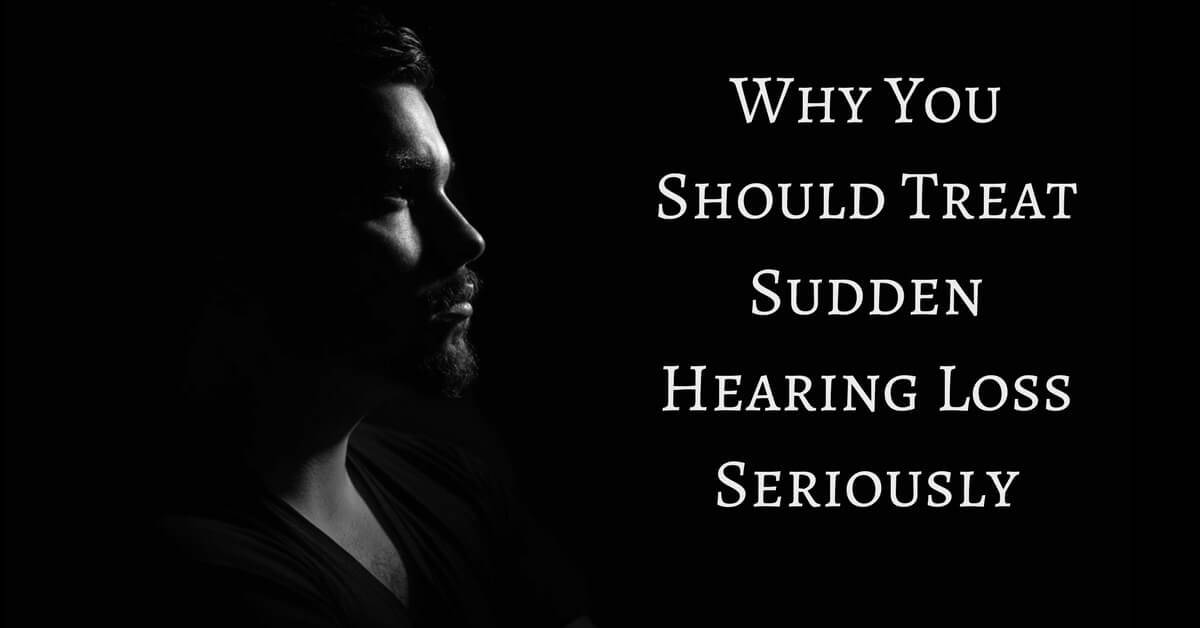Most stories of hearing loss focus on congenital or degenerative conditions whose effects are irreversible. But hearing loss can also take the shape of sudden hearing loss, also known as sudden sensorineural hearing loss (SSNHL). A much rarer instance, proper treatment can restore healthy hearing. Unfortunately, it’s a condition that isn’t widely known and timeliness is essential to the efficacy of treatment. Once sudden hearing loss occurs, the clock begins to tick, and quickly.
What is sudden hearing loss?
Sudden hearing loss is categorized by the unexplained, rapid loss of hearing. The loss of hearing is that greater than 30 decibels in three contiguous frequencies, by definition. This can happen all at once or over the period of a few days. Nine times out of ten, the sudden deafness presents in only one ear. And, oddly enough, hearing loss occurs in the left ear in 55% of cases. Tinnitus is usually present in the same ear in which hearing loss occurs. Instances of vertigo are found in nearly half of all cases of sudden hearing loss.
The cause of sudden hearing loss isn’t known, although we do know that the incidence of the condition increases with age. Men and women are equally as likely to be affected and the average onset age is between 46-49.
How common is sudden hearing loss?
It’s hard to be definitive about the number of cases actually occurring. Many times, sudden hearing loss cures itself within a few days. In these instances, medical help isn’t sought and the condition remains unreported. Based upon those people in which sudden hearing loss symptoms present themselves and undergo medical treatment, experts agree that the condition afflict 1 in every 5,000 persons per year.
What causes sudden hearing loss?
One singular cause for sudden hearing loss hasn’t been identified. A number of causes have been known to be responsible for a number of cases. These causes include infections, inner ear problems, trauma, neurologic conditions, or circulatory issues, along with a host of other known or unknown causes. The origins of sudden hear loss often remain a mystery, though, as even after a thorough search for a possible cause, the pathology is unlikely to be concretely defined in most patients.
How is sudden hearing loss diagnosed?
The evaluation of a patient seeking medical intervention with symptoms of sudden hearing loss usually begins with an examination. Medical professionals will want to know if there are any potential infectious causes or the exposure to ototoxic medications, which have been proven to cause hearing loss in some persons.
To reach a clear diagnosis, a hearing test called pure tone audiometry is usually performed. This test will examine the where sound is reaching within the ear. If it does not reach the inner ear because of an obstruction (wax or fluid), the obstruction will be removed and hearing expected to quickly restore. However, if the test determines that sound isn’t being processed by the inner ear, the cause is a sensorineural deficit. This is why sudden hearing loss is sometimes called sudden sensorineural hearing loss.
How is sudden hearing loss treated?
Historically, the treatment of sudden hearing loss has been a bit controversial owing to the lack of clarity surrounding its causes. Common treatments of the past include antiviral medications, vasodilators, carbogen therapy or simply no treatment at all. The current most popular treatment remains corticosteroid therapy. Steroids are typically prescribed in pill form, though injections directly into the ear have also been administered. This hasn’t proven to be substantially more effective though much more uncomfortable, and as such, has not gained immense amounts of popularity.
When should you seek treatment?
Time is paramount in the successful treatment of sudden hearing loss. The first two weeks of sudden hearing loss appear to be most significant, as that is when spontaneous recovery occurs in 32-79% of the cases. The chances for full hearing recovery when treatment is required is substantially higher if medical intervention is sought in the immediate aftermath of symptoms. Two weeks continues to be the magic number, as those who begin treatment within two to four weeks have the greatest chance of a successful rebound. Recovery odds decrease as severity of hearing loss increases. The coexistence of vertigo also lessens the chance for a full recovery. Age, however, does also factor in as the younger the patient, the greater the odds are that they regain previous hearing levels.
Visit Us at Hearing Wellness Solutions
For all of your hearing health needs, visit us at Hearing Wellness Solutions. We provide comprehensive hearing tests and hearing aid fittings.

